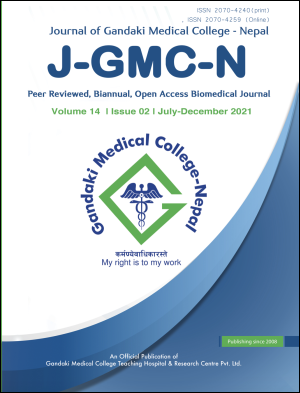Knowledge, attitude and practice of over-the-counter drug among undergraduate medical students-a cross sectional study
DOI:
https://doi.org/10.3126/jgmcn.v14i2.39336Keywords:
self-medication, knowledge, attitude, practiceAbstract
Background: Self-medication of the over-the-counter (OTC) drug is practice all over the world. Although appropriate self-medication practice can address minor illness and is time and cost-effective, it can promote irrational use of medicine; prolong the illness, drug dependency and abuse. Medical students are the future medical practitioners and play the crucial role in counseling the patients. Therefore, the present study was conducted to assess the knowledge, attitude and practice of self- medication among undergraduate students.
Methods: An institution based descriptive, cross sectional study was conducted after ethical approval was taken from the Institutional ethical committee of Gandaki medical college teaching hospital and research center (GMCTHRC) and data was collected from May to July 2018. Descriptive and correlation analysis were done with the data. The results were expressed in percentages.
Results: Among 115 respondents, 60.9 % (70) were female and 39.1% (45) were male students. Majority of respondents (94.8%) believed that instruction on the label of the drugs should be followed and 78.3% respondents agreed that OTC drugs could interact with other prescribed drugs. However, only 53.9% respondents knew that OTC drugs were Group Ga drugs in Nepal. Despite good knowledge and attitude only 37.4% students had good practice in the rational use of the OTC drugs. Moreover, Antipyretic and analgesic drugs were the most commonly used drugs. However, only 36.84% respondents (p<0.05) knew about the correct dose and duration to take the drugs.
Conclusions: We concluded that first year medical and dental should be motivated to use their knowledge into practice.
Downloads
Downloads
Published
How to Cite
Issue
Section
License
Copyright (c) 2021 Bindu Malla, Deepti KC

This work is licensed under a Creative Commons Attribution-NonCommercial 4.0 International License.
This license allows reusers to distribute, remix, adapt, and build upon the material in any medium or format for noncommercial purposes only, and only so long as attribution is given to the creator.

